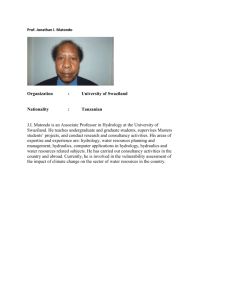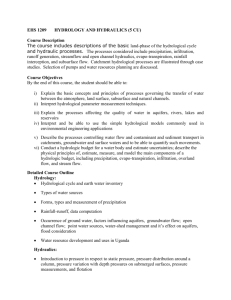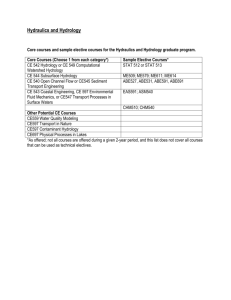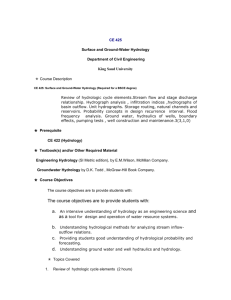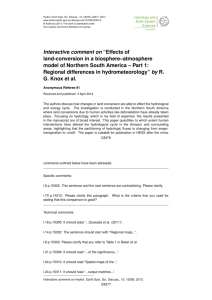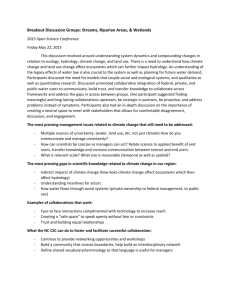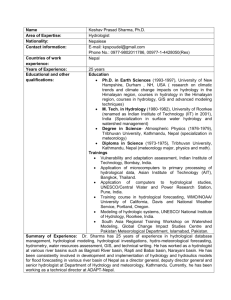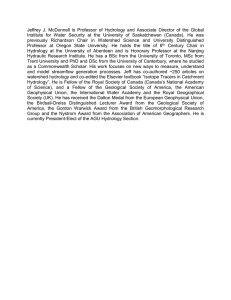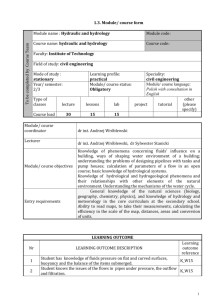PRINCIPLES OF HYDROLOGY University of Saskatchewan Geography 827 Course Objectives
advertisement
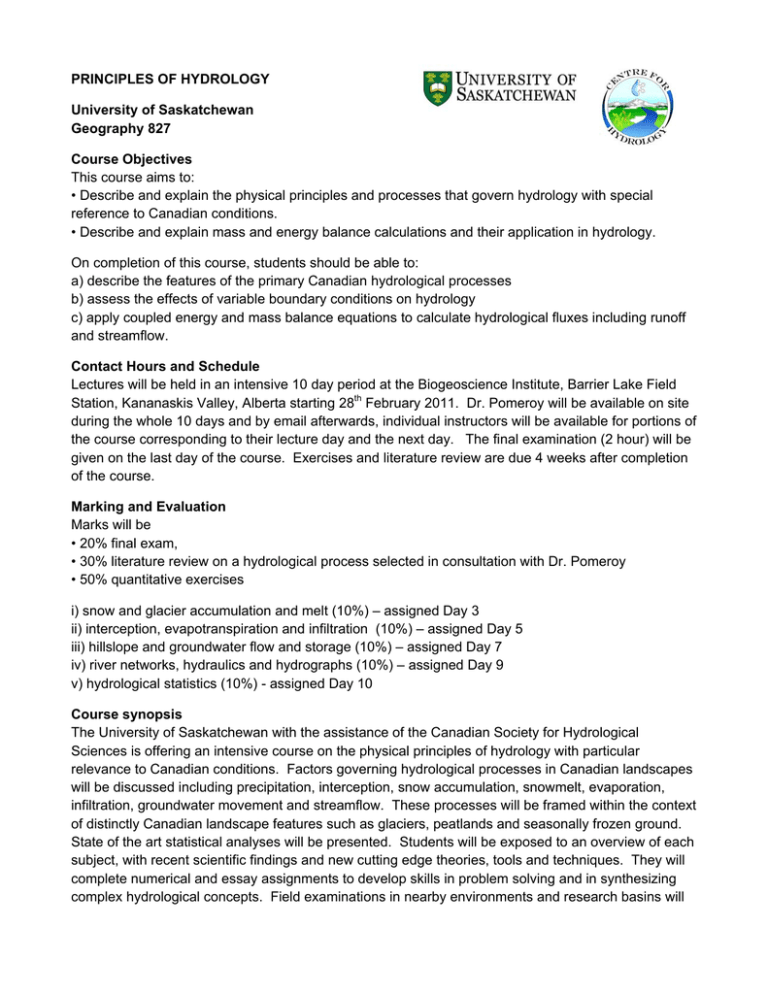
PRINCIPLES OF HYDROLOGY University of Saskatchewan Geography 827 Course Objectives This course aims to: • Describe and explain the physical principles and processes that govern hydrology with special reference to Canadian conditions. • Describe and explain mass and energy balance calculations and their application in hydrology. On completion of this course, students should be able to: a) describe the features of the primary Canadian hydrological processes b) assess the effects of variable boundary conditions on hydrology c) apply coupled energy and mass balance equations to calculate hydrological fluxes including runoff and streamflow. Contact Hours and Schedule Lectures will be held in an intensive 10 day period at the Biogeoscience Institute, Barrier Lake Field Station, Kananaskis Valley, Alberta starting 28th February 2011. Dr. Pomeroy will be available on site during the whole 10 days and by email afterwards, individual instructors will be available for portions of the course corresponding to their lecture day and the next day. The final examination (2 hour) will be given on the last day of the course. Exercises and literature review are due 4 weeks after completion of the course. Marking and Evaluation Marks will be • 20% final exam, • 30% literature review on a hydrological process selected in consultation with Dr. Pomeroy • 50% quantitative exercises i) snow and glacier accumulation and melt (10%) – assigned Day 3 ii) interception, evapotranspiration and infiltration (10%) – assigned Day 5 iii) hillslope and groundwater flow and storage (10%) – assigned Day 7 iv) river networks, hydraulics and hydrographs (10%) – assigned Day 9 v) hydrological statistics (10%) - assigned Day 10 Course synopsis The University of Saskatchewan with the assistance of the Canadian Society for Hydrological Sciences is offering an intensive course on the physical principles of hydrology with particular relevance to Canadian conditions. Factors governing hydrological processes in Canadian landscapes will be discussed including precipitation, interception, snow accumulation, snowmelt, evaporation, infiltration, groundwater movement and streamflow. These processes will be framed within the context of distinctly Canadian landscape features such as glaciers, peatlands and seasonally frozen ground. State of the art statistical analyses will be presented. Students will be exposed to an overview of each subject, with recent scientific findings and new cutting edge theories, tools and techniques. They will complete numerical and essay assignments to develop skills in problem solving and in synthesizing complex hydrological concepts. Field examinations in nearby environments and research basins will enhance the learning experience. Students will emerge from the course with a deeper understanding of physical hydrological processes and how they interact to produce catchment water budgets and streamflow response. The course will take place at the University of Calgary’s Biogeoscience Institute’s Barrier Lake Station in the Kananaskis Valley from February 28th to March 11th, 2011. The course will focus on classroom instruction, but will take advantage of the proximity to the Marmot Creek Research Basin to expose students to state of the art field instrumentation and measurement techniques. Each day will start with lectures on the primary subject, and include time to work on assigned exercises. Certain days will include a field work component to examine the processes and measurement techniques relevant to the lectures. The course is intended for hydrology and water resources graduate students and early to mid- level career water resource engineers, hydrologists, aquatic ecologists and technologists from Canada who are either working directly in hydrology and water resources or are looking to broaden their understanding of hydrological systems and processes. This physical science course is quantitative in nature and so a firm foundation in calculus and physics at the first year university level and some undergraduate hydrology or hydraulics training is required Instructors and Lecture Schedule Day 1 2 3 4 5 6 7 8 9 10 Topic Fundamentals and physical principles Precipitation & Snow Hydrology Glacier Hydrology Interception & Evapotranspiration Infiltration & Soil Water Groundwater Hydrology Hillslope, Lake & Wetland Hydrology River Networks & Hydrographs River Hydraulics and Ice Statistical Hydrology Instructors Dr John Pomeroy, University of Saskatchewan Dr John Pomeroy, University of Saskatchewan Dr Gwenn Flowers, Simon Fraser University Dr Richard Petrone, Wilfred Laurier University Dr Charles Maulé, University of Saskatchewan Dr Masaki Hayashi, University of Calgary Dr Sean Carey, Carleton University Dr Kevin Shook, University of Saskatchewan Dr Peter Steffler, University of Alberta Dr Don Burn, University of Waterloo Course Texts • Physical Hydrology, 2nd Edition, S.L. Dingman, Waveland Press, Long Grove, IL, 2008 (including CD) ISBN 978-1-57766-561-8 • The Surface Climates of Canada, W.G. Bailey, T.R. Oke and W.R. Rouse, 1997, Montreal: McGillQueen's Univ Press. . • Handout of notes for a revised Handbook on the Principles of Hydrology (DM Gray & JW Pomeroy) Readings Readings will be assigned for each topic and distributed in advance electronically.
